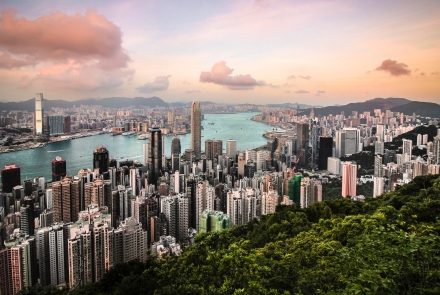
Photo by Florian Wehde on Unsplash
Hong Kong’s climate weakness
Hong Kong should be a regional leader in combating the climate crisis, but it is in desperate need of a policy revamp, Wendi Li writes.
Despite its role as a major global city in the region and a member of the C40 Cities Climate Leadership Group’s steering committee, Hong Kong has yet to come up with an effective policy response to climate change.
In 2017, the Hong Kong government unveiled its first and only strategic plan for combating climate change, its Climate Action Plan 2030+. The Plan outlines general goals to be achieved by 2030, but it does not spell out concrete steps for the Hong Kong government to take to achieve those targets.
A closer look at the document reveals that the Hong Kong government does not plan to pursue the carbon emission reduction target set by the C40 Leadership Group, which is to help keep global temperature rises within 1.5 degrees Celsius.
According to the Plan, Hong Kong’s climate goal, rather than locally administrated, is contingent upon China’s national action scheme, which aims to keep global temperature rises below a less ambitious two degrees.
Planning within a national framework designed to fulfil a developing country’s duty provides Hong Kong, a well-developed economy, leeway to not take its fair share of responsibility for reducing emissions, and the government should aim to do better than this.
Reports show Hong Kong has fallen short of 78 per cent of the 2030 carbon emission target set by the C40 cities at the end of 2018. This is simply not good enough, whether its decisions are made in a national framework or not.
The Plan also over-optimistically concluded that Hong Kong is well-prepared for future climate risks. This is just not the reality. Typhoon Mangkhut, the region’s most intense cyclone since 1946, hit Hong Kong hard in 2018, causing record-high damage, and demonstrated the island’s weakness in the face of climate disaster.
More recently, the Hong Kong government tasked its Council for Sustainable Development to conduct public consultation on a long-term decarbonisation strategy from June to September 2019. Almost a year later, there is still no further progress on this.
In fairness, it has been a busy time in Hong Kong. Last year’s anti-extradition bill protests and this year’s COVID-19 pandemic have occupied the Hong Kong government, and it has spent much of its time dealing with these political and public health emergencies. This is not an excuse, however, for ignoring the need for a good climate policy.
As well as stalling on decarbonisation, Hong Kong has fallen behind in tackling plastic waste. In contrast with the Chinese mainland, where non-degradable single-use plastic bags, straws, and eat-in restaurant cutlery are to be banned by the end of 2020, Hong Kong runs a Plastic Shopping Bag Charging Scheme which allows consumers to buy plastic bags freely, with no end in sight for this policy.
Importantly, many people in Hong Kong want more action on climate. ‘No plastic straw’ campaigns pop up often in schools, universities, and restaurants in Hong Kong, and environmental organisations, young citizens, and other civil society groups, rather than the government, have become the main force combating climate change in Hong Kong.
For example, Bye Bye Plastic Bags, a global youth-driven campaign dedicated to single-use plastic elimination, has a Hong Kong team who actively advocate for change. Since 2018, team members have started to speak for their concerns at sustainable forums and festivals, organise community activities such as plastic-free challenges and beach clean-ups, and lobby local shops and restaurants to be mindful of their plastic consumption.
The Business Environmental Council is another example. It was established by Hong Kong’s businesses to advise primarily its own sector on environmental concerns and sustainable development. It introduced the Low Carbon Hong Kong Initiative in 2017 to research and survey feasible decarbonisation targets for the business community in Hong Kong.
In early 2019, it launched its Low Carbon Charter to urge local businesses to lower their emissions, starting from the property and construction sector, which contributes the most to Hong Kong’s carbon footprint.
As of June 2020, 66 businesses have given their pledges to the Charter, and the Council’s plan is an example of how to prompt stakeholders into climate action that the government should follow.
No matter how useful this grassroots action can be, it is no replacement for government action. One joint research report shows that although the Hong Kong government proposed to reduce carbon emission by 20 per cent by 2020 using 2005 as a base in its policies, it was reduced by a measly 1.2 per cent by 2017.
According to official statistics, as of June 2020, greenhouse gas emissions in Hong Kong haven’t been decreasing steadily either. It is obvious that due to a lack of policy guidance, Hong Kong is failing in its attempt to fulfil its climate policy obligations.
The Hong Kong government has to take more action on climate change. Its first step should be introducing and implementing policies that aim to keep a rise in global temperature of below 1.5 degrees, the objective of the C40 cities network, not the two degrees in China’s national framework.
Immediate steps towards plastic waste reduction, renewable energy development, and decarbonisation are crucial too, and upgrading and adapting Hong Kong’s city infrastructure to be more environmentally friendly should be commenced as soon as possible.
To speed up its policy-making, the Hong Kong government should borrow elements of the well-researched ideas and reports of the civil society groups and think-tanks that have been working on this for years.
If the ongoing extreme floods in the southern part of China can teach Hong Kong anything, it is that the changing climate is rapidly outpacing human preparation with catastrophic results. The government needs to act urgently to have any chance of playing its part in combating the climate crisis
Updated: 1 July 2024/Responsible Officer: Crawford Engagement/Page Contact: CAP Web Team












